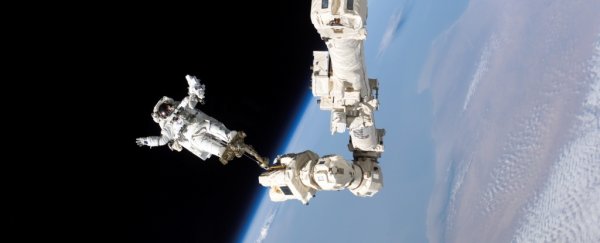Hanging about in space can do pretty strange things to the human body, which is poorly adapted to life without gravity. It can create a slew of health problems, keeping clean is a huge hassle, and doing a wee is majorly awkward.
But is it true, as a Snapple cap asserts, that you can't burp?
This is the question one Twitter user posed to former International Space Station (ISS) Commander Chris Hadfield late last week, and received a surprising answer: it's true, kinda.
You can't burp in space - at least not like you do here on Earth.
"You can't burp in space because the air, food and liquids in your stomach are all floating together like chunky bubbles," Hadfield replied on Twitter.
"If you burp, you throw up into your mouth. So guess where the trapped air goes?"
Air can, of course, travel from your stomach and out through your mouth in space. But the problem is the lack of gravity. Here on Earth, when you have gas trapped in your stomach, it rises to the top because it's lighter than the food and stomach juices in there.
In space, where there is no gravity, the gas doesn't rise to the top. It stays mixed in with all the other stuff that's in your stomach - like the below video, an ISS experiment that involved putting an effervescent tablet in coloured water.
So, if the gas wants to come out of your mouth, it brings that other stuff with it. It's sort of a cross between a burp and a spew.
"When one burps in space, it is often a 'wet burp' which means some liquid is expelled," NASA engineer Robert Frost explained on Quora in 2016. "It's kind of like acid reflux."
And in 2011, Charles Bourland, a consultant for the NASA Food Technology Commercial Space Center, noted, "if you burp in space, it's usually wet because the liquid and gas doesn't separate in your stomach like they do on Earth."
This rather unpleasant experience has also been called a 'bomit', which should give you some idea of exactly how horrible it is. Imagine having it happen in a spacesuit.
There are further problems. You don't necessarily want all that gas going out the other end, either. The space station is a small, enclosed environment, and therefore can get pretty smelly.
In the 1960s, scientists conducted experiments to determine which space diet would produce the least farts, because - wait for it - flammable butt gas was deemed a hazard in a pressurised cabin.
Apparently beans and other high-flatulence foods such as cabbage and Brussels sprouts were subsequently removed from the spaceflight menu, although green beans and broccoli are now included.
And there is actually air circulation on the ISS to keep astronauts from suffocating on their own CO2 exhalations, so farts get moved away, too.
If you do end up going to space, there was one enterprising astronaut who found a way to belch without bomiting. According to the book What's it Like in Space? by Ariel Waldman, NASA astronaut and physicist Jim Newman, who has spent 43 days in space, developed what he called the "push and burp."
"He found that by pushing off a wall, he could create a force in lieu of gravity that kept his food down in his stomach, giving him a brief chance at expelling gas without consequence," Waldman wrote.
Astronauts are certainly brilliant people.
